Editor’s note: Micah Danney is a GroundTruth and Overseas Press Club Foundation reporting fellow who teamed up with editor-in-chief Charles Sennott to report “End of Days,” a series of written profiles and podcast episodes exploring the growing influence of Christian Zionists in Middle East politics as they work with the Israeli right to fulfill what the Zionists believe is biblical prophecy. Danney spent five months immersed in the Christian Zionist community in Jerusalem and the West Bank and interviewed scores of believers and dozens of religious leaders in this movement. Here he profiles several members of the movement as well as other Christian leaders and activists.
Wayne Hilsden

Wayne Hilsden, the former head pastor of King of Kings, founded FIRM in 2015. He and his wife Ann had moved to Jerusalem from Canada with their two sons in 1983 to help another Canadian couple establish a congregation there. King of Kings started as a Bible study group in their living room. Hilsden oversaw the congregation’s growth in the years between. He founded Israel College of the Bible a half-hour north of Tel Aviv, where hundreds of Israelis have trained for ministry. They are members of the Messianic Jewish movement, which FIRM claims number around 30,000 in Israel – up from 5,000 in 1999.
A core aspiration of believers, as evangelicals in Israel refer to themselves, is to help Jews recognize Jesus – Yeshua in Hebrew – as the messiah. Himself a Jew, Jesus belongs to Judaism as much as Christianity, believers say. Combined with the necessity of this recognition for spiritual salvation, bringing Jews to belief in Yeshua as messiah is as important to God’s plan as bringing the world’s Jews to Israel, where they must be for Jesus to return to earth, according to interpretations of certain Old Testament verses. In services at King of Kings’ Jerusalem facilities, which are home to 11 separate congregations – some of them Hebrew-speaking – delineations between Christians and Jews fall away. Jewish traditions and garments, and Torah scrolls, are present among worshippers who praise Jesus with eyes closed, their hands held high, palms up.
“There are three main things that we set out to achieve these past three decades,” Hilsden told an Israeli Messianic publication when he pivoted to FIRM’s leadership, “plant congregations, train people for ministry, and be a catalyst for unity and cooperation in the wider body.”
FIRM is that catalyst, providing its members with the “widest possible platform to promote their efforts,” Hilsden said.
Don Finto
Don Finto is one of FIRM’s board members. The 88-year-old pastor from Tennessee sat at a small table at the Jerusalem Encounter conference in June, warmly greeting attendees and colleagues as he signed copies of two of his books, “Your People Shall Be My People” and “The Handbook for the End Times.”

Finto founded Caleb Company, which runs Israel-centered training programs, a ministry school and Holy Land tours. He points to Puritan church doctrine from the early 19th century, when modern Christian Zionism germinated and was popularized in England, as evidence that evangelicals have been proven right about a Jewish return to the land God promised them in scripture. That prophetic fulfillment includes Jews “coming to the Lord,” he said.
Thus the Messianic movement is further proof for Finto of prophetic fulfillment in our time. All of this makes clear that Christians have a duty to evangelize in the world’s only Jewish state.
“Romans 11:11 says that salvation has come to the gentiles to make Israel jealous,” Finto said. “We should be so empowered by the Lord that Jewish people are jealous of the way we know God.”
He added that he couldn’t be a part of any ministry that “would not talk to the Jewish people about their own messiah.” Statements by prominent Christians about the error of Jewish theology in not recognizing Jesus have caused controversy. Michelle Bachmann apologized at the Knesset last year for past comments she made about Jews needing to convert, and the participation of evangelical leaders John Hagee and Robert Jeffress at the US embassy opening ceremony days later thrust controversial statements by each back into the spotlight.
Many Jews consider the alliance between evangelicals who scorn rejection of Jesus and a staunchly Jewish Israeli government concerning, despite its political and financial benefits. And evangelicals in Israel, America and elsewhere tend to be adamant that Christians must make up for many past horrors committed against Jews in Christianity’s name. While they still insist that Jews must repent and accept Jesus as the messiah, any suggestion that this constitutes anti-Semitism is dismissed.
“The most anti-Semitic thing that you can do to a Jewish person is not tell them about their own messiah,” Finto said.
On a recent Holy Land tour led by another evangelical octogenarian, legendary crooner Pat Boone, a group of American tourists listened as Boone explained that God’s love is presented as an ultimatum. Though Moses followed all of God’s instructions in leading his people to the promised land, one error ended Moses’s life before he could enter.
“It seems harsh, but Moses had to learn like we all do, you don’t trifle with God,” Boone said atop the ancient Jewish fortress of Masada. “When He tells you to do something, you better try to do it like He says.”
James and Melissa Patton
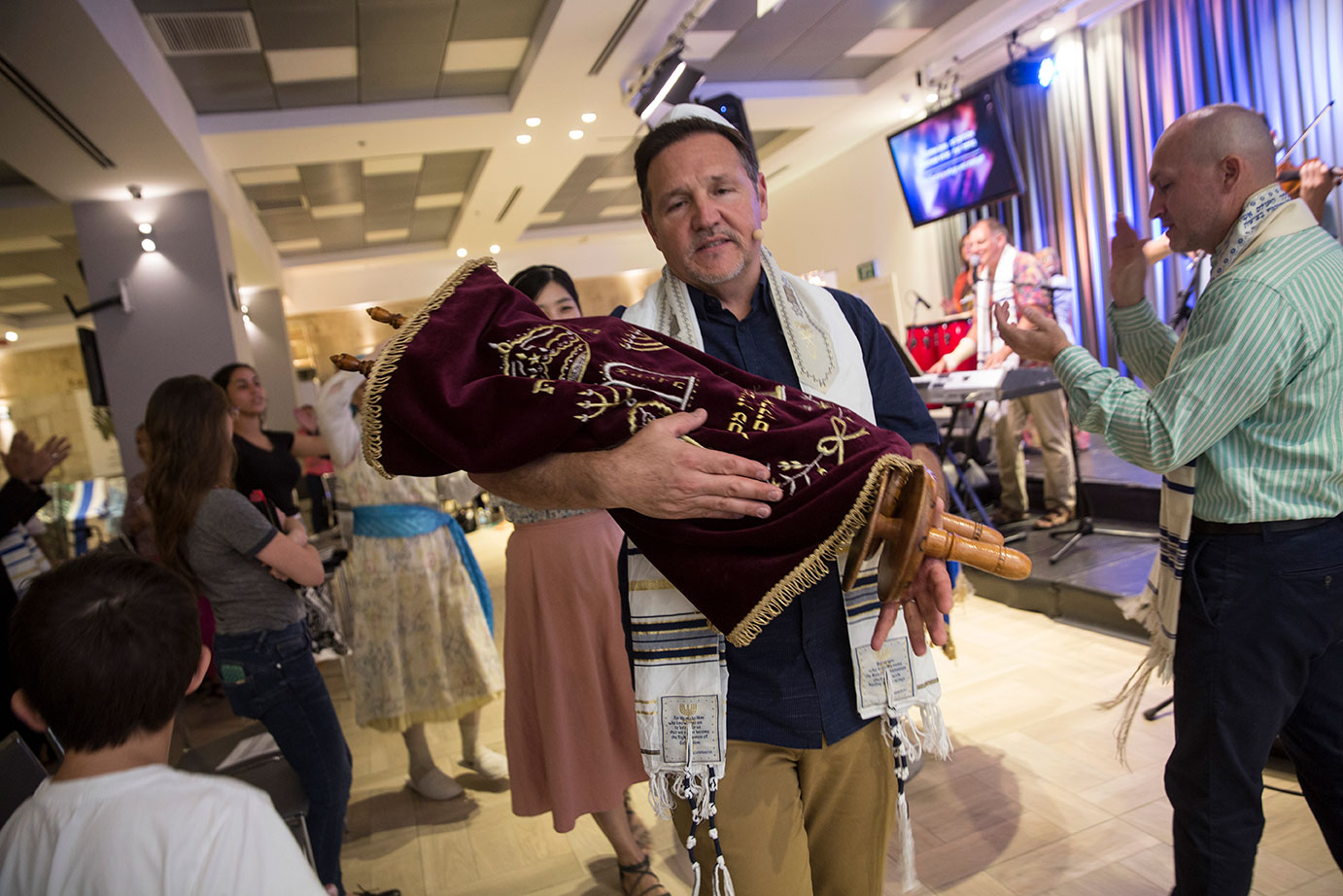
Weekly home group meetings of believers like the one King of Kings grew out of are a cornerstone of the community. There are several dozen in Jerusalem. Each Wednesday between 10 and 20 people gather in the living room of James and Melissa Patton. Someone leads a musical worship, usually with a guitar and soft singing voice. The lyrics are displayed on the TV screen via someone’s phone. Group members take turns speaking to Jesus for several minutes each, sometimes speaking in tongues between sentences. About an hour in, they dig into a portion of scripture. Out of windows that span the length of the apartment, the sun sets over an impressive view of West Jerusalem.
James is director of facilities for King of Kings. He negotiates and manages contracts for the congregation’s properties. Melissa works at its counseling center. Originally from Kansas City, the Patton’s moved to Jerusalem three years ago. They served as elders until July, when they stepped down to prepare for a move to Switzerland next year. Like many congregation regulars, they construct their lives in Israel within the boundaries of limited visas.
On a weekend trip to Arad, in southern Israel, they visited a friend working as a docent at a sculpture installation called the Fountain of Tears. Located in a space behind the artist’s home that is covered by a large tent structure, the installation is completely hidden and unremarkable from the outside. The piece features a series of life-sized Christs on crosses. Beneath each crucifix is a life-sized figure of a striped-uniform-clad Holocaust survivor reacting to the corresponding Christ. He’s modeled on an unknown survivor who appears in a photo.
The installation drips with symbolism in almost every detail, which the docent explains with some help from a recording. Water literally drips down stone columns between each crucifix. The piece is meant to link the suffering of Jesus for humanity to the suffering of humanity in the Holocaust.
Back inside the home, the docent – a Russian immigrant who worked as secretary to King of Kings head pastor Chad Holland for two years – told the Patton’s about being heckled in Arad by children of the city’s large Orthodox community. When locals get wind of a believer’s presence in the neighborhood, they often protest or harass them, she said. It’s a common tension faced by believers in Israel. James noted the regular presence of Mordechai, a member of the Orthodox anti-missionary group Yad L’Achim, at the entrance to King of Kings’ Sunday services. He takes pictures of attendees with his phone, James said. The evidence can be sent to Israel’s Interior Ministry, which can deny citizenship to Jewish applicants who have demonstrated Christian beliefs.
The group drove to an overlook at Arad’s edge as the sun descended toward the horizon. The spot boasts a stunning, nearly 360-degree view of the surrounding Negev desert’s hills. It was Friday and approaching Shabbat. An Orthodox man walked further out on the overlook, past the group as they shared a bottle of Israeli-made red wine. James walked out to him, camera in hand. They chatted as the wind whipped around them before James stepped back to take a few shots of the man, whose name was Mordechai, at his request. James returned to the group.
As Mordechai stood with his back to them, facing the vast undulating desert and swaying in prayer as the Shabbat sunset’s reach retreated from the landscape, they held hands in a circle and prayed that Mordechai may open his heart and know Yeshua.
In the car on the way back to Jerusalem, James and Melissa explained that the Temple Mount, where Abraham brought his son Isaac to sacrifice to God, is where Yeshua will return. The site’s status as the third holiest site in Islam, home to the Dome of the Rock and Al-Aqsa Mosque, makes sense in God grand scheme, Melissa said.
“Why is Islam in Jerusalem? Because the enemy always wants to bring a counterfeit,” she said. “He always brings a counterfeit, because just in the way that Satan was an archangel of God, and he fell because of pride, and so now his goal is – he always counterfeits the truth.”
The conflict that makes headlines for its airstrikes, rocket attacks, shootings and stabbings does not have geopolitical causes, but supernatural ones. It’s a religious war between good and evil.
“Allah is not the god of Abraham, Isaac and Jacob,” Melissa said. “He’s a false god. He’s not – I believe it’s Satan himself, that deceives. Because – why can I say that confidently? Because the word’s very clear that Satan comes to kill, steal and destroy.”
The fruits borne by the god the Patton’s study with their friends in their living room are peace, love, gentleness, patience and joy – not the destruction and murder wrought by Muslims who want their land back, despite having no Biblical claim to it, James said.
“They believe they’re still fighting to get their land back. Israel says, ‘This is our land. Let’s have peace,’” he said. “To Israel – ‘We’re in our land, now let’s have peace.’ Muslims say, ‘It’s not your land, we’re still at war.’”
Gail Barton
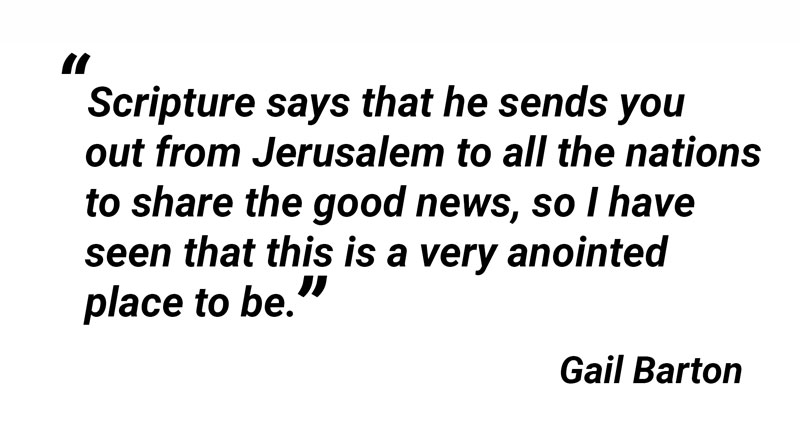
On the 20th floor of one of Jerusalem’s tallest buildings is a worship room known as the Israel Prayer Tower. It is lined with windows that allow a panoramic view of the surrounding city. The space occasionally hosts groups and events, but there’s only one other woman there while Gail Barton sits hunched over her Bible.
“I’m not in a good way today,” she said in a heavy Southern drawl. Her three-month visa was nearing its expiration, and she had missed her flight home to Georgia. Barton, 63, has made trips to Israel to volunteer with ministries for a few months at a time in recent years, having always had a “heart for the Jewish people,” she said.
Barton was a rebellious teenager and found her way to “much darkness,” dark enough that she can point to a scar on her wrist where she tried to end her life. She spent 27 years addicted to opiates until “the Lord delivered me from that,” she said. She has since dedicated herself to serving Him as the director of a homeless women’s shelter, then in Israel. Barton has met people from all corners of the world in Jerusalem, called there by God to understand the importance of Israel: “Scripture says that he sends you out from Jerusalem to all the nations to share the good news, so I have seen that this is a very anointed place to be.”
Being in the land gave her a heart for Arabs, she said. She met Palestinians in Bethlehem whose economic conditions and whose emotional openness softened her heart to them, and she made friends with a family that live on the Mount of Olives. Barton became emotional as she spoke about her visits there. She wanted to see the situation from both sides, she said, and she became convinced that each side needs to forgive the other, although she doesn’t know how that can be accomplished.
Barton said she doesn’t believe the conflict will end until Jesus returns to earth, but thinks humanity’s job is to strive for peace in the meantime.
Chad Holland
As conflict simmered at the Gaza border fence in mid-July, Chad Holland paced the stage during King of Kings’ Sunday service. He invited his audience of regular congregants and visiting tourists to trust in God’s faithfulness despite news about burning kites and tunnels, and to pray for His protection.
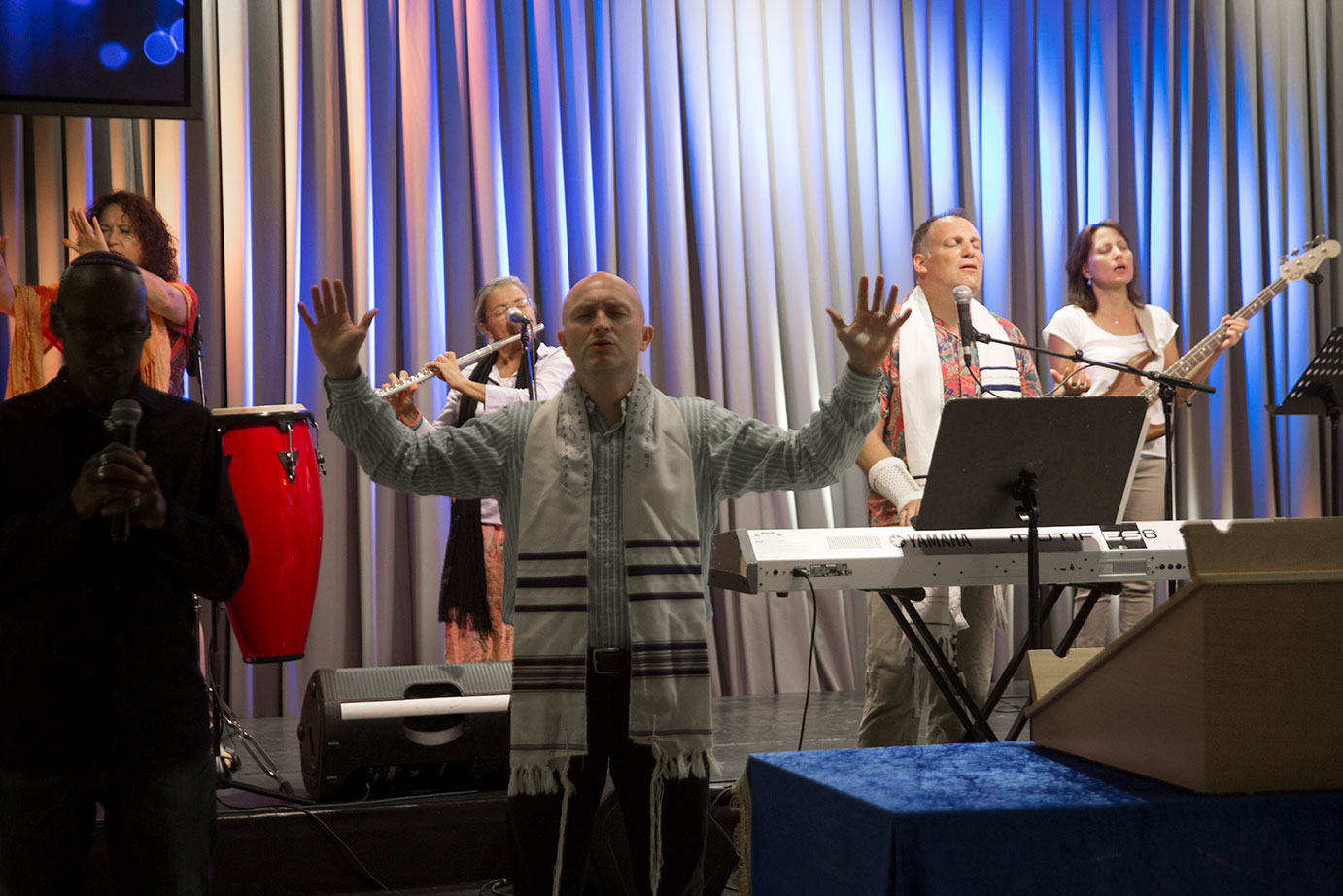
“We thank you for our military, that you are guiding them today, that you are securing them, giving them wisdom and strategies to uncover the deceitfulness of the evil one,” Holland said. “And father we pray tonight for those that are under the influence of the evil one to come to the truth in the name of Yeshua.”
He asked God to bless the non-believers with encounters through dreams or visions that would wrench them from their wrong paths.
Holland had his first encounter when he was 6, he said. It happened at summer camp. From that moment forward, he dedicated himself to understanding what it meant to obey Yeshua as his king, he said. His parents had divorced when he was a baby, and his mother married a Jewish man who was a believer. He had a Jewish upbringing and attended a Messianic Jewish synagogue with his family.
As head pastor at King of Kings, Holland leads a mixed congregation of Jewish and non-Jewish believers and a twice-per-month Messianic service in a room near the main sanctuary. At the latter service, he wears a kippah on his head and a Jewish prayer shawl. Near the end of the service, Torah scrolls are removed from their closet and unsheathed. As this happens, Holland explains that the scrolls are not what is being worshipped. They are then carried ceremoniously around the room. Worshippers reach out to touch them as they pass, and a procession forms behind the carrier as he goes.
Outside of services, Holland manages a small staff that runs King of Kings, which operates on an annual budget of about $2.5 million. Large individual donations and small ones from congregants in churches in various countries account for much of that, according to Michael Bryan, head of finances for King of Kings.
Sitting in his office, Holland explained his belief that Satan’s demonic forces seek to destroy the Jewish nation in order to break God’s covenant with his chosen people, proving that God is not all-powerful. The conflict is not about land, politics, racial differences or any of the other distorted framings it is often presented within, he said – it’s about Satan’s ancient struggle against God.
That means it is the duty of all who want to honor God to steadfastly support Israel, yet Holland doesn’t advocate for any particular political or military solution. It is through a personal relationship with Yeshua, he said, that people gain a better appreciation for life and all of God’s creation, and therefore become instruments of the peace He calls for. Holland’s only solution is a spiritual one, “where we embrace both Jew and Arab; where we embrace Yeshua as the prophesied messiah.”
Holland said he avoids trying to guess the prophetic hour because he believes the scripture that says it isn’t meant to be known, and he’s satisfied with signs that indicate the world is generally moving in the right direction. He doesn’t dismiss political engagement entirely, though.
“When a strong Bible-believing person is in charge, there’s a great blessing and peace that falls over that nation, and maybe that’s what we need to pray for,” he said.
Holland is often asked if he thinks another war is coming, he said. He does, on a global scale. “I think it can be used for both positive and negative,” Holland said. “I think the pressure of war and the sadness of loss will open up some people’s hearts to the messiah, so that can be a good result. But on the sad side, you’re going to lose lots of people, and that’s not a good thing and we’d never want to condone that.”
Jessica Stekla
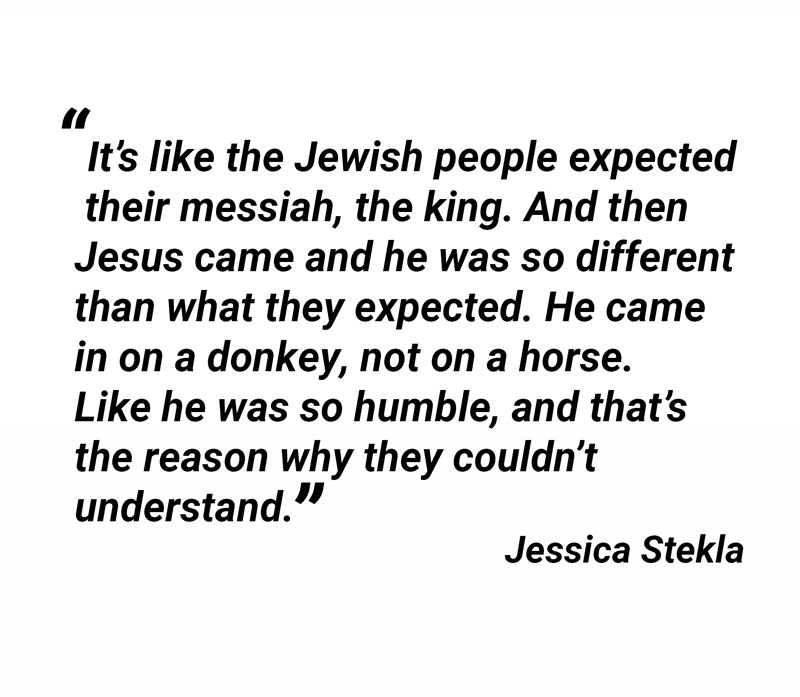
King of Kings has its own prayer tower on the Clal Building’s 14th floor. On a quiet afternoon, volunteer Jessica Stekla, 26, sat at its reception desk. Stekla is ethnically Polish but lives in Germany. Her parents were Christian and not especially religious, but Stekla said that at 17 she felt a general sense of loneliness. She looked to the bible for answers. Scripture told her that God knew her name and loved her, she said. She found community in faith-based youth groups, camps and conventions.
“I think a lot of people feel kind of lonely in this world,” Stekla said. It can feel like a person’s merit is based on achievement, she said, but in the church community being yourself and sharing in God’s love is enough.
This trip was Stekla’s third time in Israel, and her first stint longer than three months. She was in Jerusalem on a six-month visa this time. It is God’s chosen city, she said, but she was still trying to figure out what made it so important. She had no firm opinions about end times predictions. God does what He wants regardless of what people expect, Stekla said.
“It’s like the Jewish people expected their messiah, the king. And then Jesus came and he was so different than what they expected,” she said. “He came in on a donkey, not on a horse. Like he was so humble, and that’s the reason why they couldn’t understand.”
Life in West Jerusalem is quiet, Stekla said. She hadn’t heard about the Palestinian man who was shot and killed in the Old City three days earlier when he tried to stab an Israeli policeman. The perpetual violence is easy to tune out if you ignore the news and focus on your daily life, she said.
Stekla prefers not to choose a side in the conflict or form opinions about political matters like the embassy move. She likes to hear all perspectives and keep her focus on people, she said. She traveled with two friends to the Palestinian city of Nablus in the West Bank several weeks prior. Their guide had fought against Israeli soldiers during the Second Intifada. He introduced them to his uncle, who had lost his sight and hearing to an explosion of Israeli ordnance.
“I looked at his uncle and I thought oh my gosh, this is so amazing,” Stekla said. “That Jesus – like you can pray for him and Jesus can heal him out of this whole conflict. And like, who is right, who is wrong, and everyone wants to have their own, like, they want to win the land, but then Jesus comes and he can heal this mess. He can bring peace.”
Christians can be the light and the peacemakers, Stekla said. It might not sound logical, but that’s how God’s kingdom works, she said. It’s not what we expect. It’s opposite. It’s upside down.
Susan Pratt
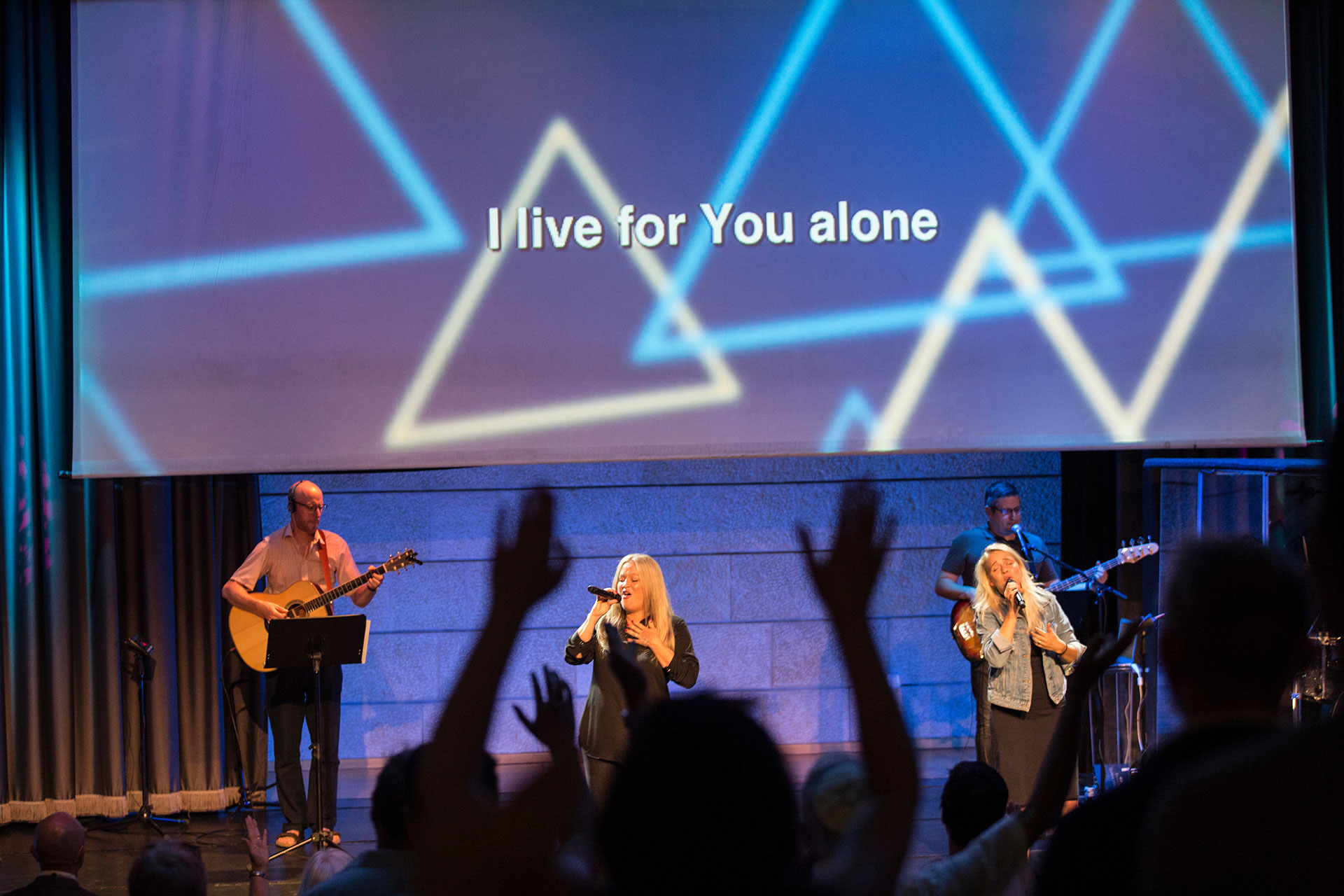
When Susan Pratt, 31, sings on stage with the King of Kings musical worship team, she cries. Her eyes are closed through much of the songs. Tears stream down her cheeks continuously.
Pratt was born in Canada and raised Catholic but spent most of her life between Oklahoma and Michigan. Her parents converted to Protestantism but maintained their strict Catholic sensibilities about personal conduct, Pratt said. When she got a boyfriend they didn’t approve of, she spent a year in rebellion, “living in sin.” Through the advice of others and her seeking of the Lord, she ended the relationship and began her process of learning that God’s love wasn’t something she could earn, she said.
“And so when I’m on stage and I’m worshipping the Lord, I’m thinking about – I’m even getting emotional now – I’m thinking about the fact that he took away my sin, and he – he redeemed me,” Pratt said.
She and her husband Dustin had friends at their church in Michigan who made trips to Israel and were involved in the building of the King of Kings facilities early on. The Pratts followed and volunteered with the ministry. They felt called to something more, so when Dustin was offered a job helping to run the Prayer Tower’s activities, they accepted. Pratt is now a worship leader with her own office in the Prayer Tower.
While she’s quick to note that her understanding of scripture and prophecy is novice, Pratt said she sees Christians as kindred bearers of God’s covenant with Abraham and his offspring. While Jews originally owned the promise of this land and still do, she said, Paul the Apostle makes clear in his writings that all who have faith in Christ are Abraham’s seed and share in that promise.
Alongside her prophetic understanding is a political awareness that Pratt said she struggles to make sense of. She sees an ethnically diverse population living comfortably in Israel, proof that the country is a hub of human rights in the region. She sees anger and hate from Arabs in Israel, in Gaza and in neighboring countries as an obstacle to the peace Israel desires. Pratt also wants to understand the perspective of Palestinians, she said, and learn how to include them in her ministry. She admits having a bias favoring Israel and sees how that could alienate Palestinians. It’s a dynamic Pratt said she’s aware of generally with Christians pronouncing such steadfast support for Israel, including some she knows who she said cross the line into racism.
“To me, it’s quite disturbing,” Pratt said.
On the other hand, people can look at the suffering in Gaza and dismiss the threats posed by Hamas, she said. Pratt was cautious on these points. “Correct me if I’m wrong,” she said before addressing the claim that Hamas uses civilians as human shields. She said that Americans should be cautious too when considering who deserves support.
“I think Americans need to be aware that these governments are not the same as the people, and the people are actually the ones suffering,” Pratt said. “So when you’re supporting governments, you’re supporting a lot more than you realize and you’re probably adding to the conflict.”
Michael Mistretta
At the Jerusalem Encounter conference last June, Michael Mistretta would spend a few minutes emceeing between speakers and musical acts. At 25, he’s the youngest of FIRM’s board members. He has a marketing background that he applies to FIRM’s myriad activities, and after the conference he flew to Guatemala to help train evangelical youth leaders there in how to understand and preach about Israel. That’s part of FIRM’s global outreach.
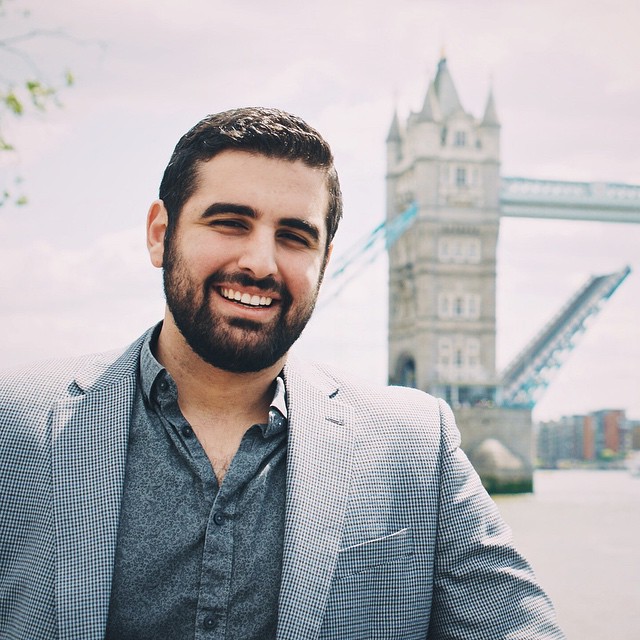
“We don’t go after the Israel-loving Christians,” Mistretta said. “In fact, the way we define ourselves, one of our missions is to engage the unengaged.”
Mistretta drew a distinction between the enthusiasm he displays as a speaker and what he described as his parents’ generation of pro-Israel Christians. Theirs was a romantic affection, he said. They wave Israeli flags, blow shofars and fawn over anointing oils and the stones of ancient sites on Holy Land tours. They remember the Six Day War and the Yom Kippur War and the desperation of a young country fighting for its survival. They tell those stories the way parents talk about a favorite movie from their youth, Mistretta said.
“They remember it as absolutely amazing in its day, but you’re like graphics are bad, kind of cheesy. Acting’s a little bit sucky. Why do we care?” he said. “So we have a need to present Israel in a different light, and I think the light is not a romantic love for us.”
Young evangelicals want to connect with the place and the people in it in a personal way, he said. They want to understand how modern-day Israel is relevant to their spirituality. They want to explore it. They want to participate.
Many don’t want to participate, however, in the politics. Young people are coming of age with a host of social justice issues confronting their generation, and young Christians don’t want to just inherit outdated political positions. They want to have an impact, Mistretta said. Many feel compelled to consider Palestinian grievances and resist taking a political stance in favor of a humanitarian one. Conditions for Palestinians are clearly cause for concern, he said, and Christians should think about that.
“But I think it’s important to understand the history on both sides because in the big picture, Israel is really the underdog,” he said, adding that the media inaccurately presents the situation in reverse.
Mistretta grew up reading the “Left Behind” book series of post-apocalyptic fiction. The story’s protagonists converted to Christianity after all of the Earth’s Christians were raptured up to heaven, and are left to navigate a chaotic world ruled by the Antichrist. The series’ 16 novels sold more than 80 million copies.
But Mistretta said his faith isn’t defined by such fantastical tales. His vision, and that of FIRM, is for a “unified front” of Christians on the ground in Israel who can synergize Christian activity there, and direct donations from abroad to the people doing that work. With between $100 and $200 million flowing into Israel from Christian donors, he wants a larger portion going to Christians. If a Christian minority plays the role of peacemakers in Israel, financial support can translate to political influence that can be leveraged to rein in the Israeli government’s excesses, Mistretta said.
“I think that’s just where Israel needs to grow,” he said. “And I think we as believers in the land, as we’re speaking prophetically to our nation we could say hey, we’re called to love the foreigner, we’re called to love our neighbor as we love ourselves.”
Omar Haramy
From the Clal Building, a 15-minute ride on the light rail into East Jerusalem brings you to the headquarters of Sabeel, a non-denominational organization led by Palestinian Christians. Sabeel advocates for Palestinian rights using the teachings of Jesus and liberation theology, which seeks to serve the poor and oppressed through political and civic action.
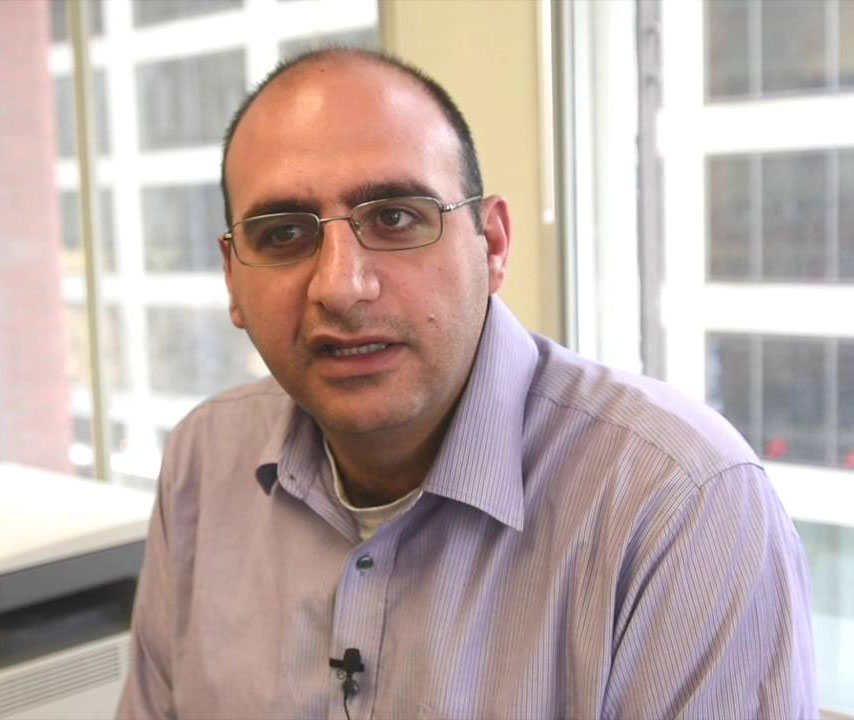
Omar Haramy is a head administrator at Sabeel. The theology behind his work is the same that motivated Jesus, he said. It’s about correctly identifying who is suffering and responding to that with compassion and sacrifice.
“We do this work for justice, not because we care about Palestine,” Haramy said. He echoed some themes commonly professed by evangelical Christians living in or visiting Israel – that Christian theology has been misused in the past to vilify and oppress Jews, that Jesus’s message is clear and that Christians are called to apply it to the present situation in his homeland, in service of a “new Jerusalem.” The narratives diverge in what they emphasize.
Haramy rejected the notion that historic crimes against Jews make their concerns paramount, not while Palestinians can be corralled, evicted, imprisoned or shot at the whim of Israeli authority. He also rejected the evangelical premise that salvation requires adherence to their interpretation of scripture and acceptance of Jesus as messiah. True acceptance of Christ, and true salvation, is emulation of him and the ethics he espoused.
“We all are very tribal and we’d like people to look like us and to talk like us, to worship like us,” Haramy said. “That’s not the way of God.”
He dismissed the idea of a post-apocalyptic new Jerusalem ruled by Jesus Christ from a throne on the Temple Mount as appealing to people’s desire for a magic show. The real magic, he said, is found in human interaction and reconciliation between foes. In his theology, acts of kindness and forgiveness are the miracles that can create a new Jerusalem defined by peace and harmony.
“What leads us to this utopian culture?” he said. “Isn’t it standing for the oppressed and challenging oppressive systems?”
From his office in East Jerusalem, Haramy said he sees a plan for Israel unfolding not according to God’s love but rather the desires of groups holding power. The human and legal rights of Palestinians are supplanted by the ambitions of the Israeli government and its evangelical allies, he said, with the blessing of a vengeful God that they created.
“You tell me who your God is, I will tell you who you are,” Haramy said. “So if you are a racist, exclusive, violent, oppressive person, then your God is going to look very much like you.”
Usama Zoughbi

Usama Zoughbi took a small box from a shelf and put it on the table between himself and two visitors. The box was filled with small metal projectiles of various shapes and sizes. Some were steel balls coated in rubber, though to the touch the rubber was hardly distinguishable from solid metal. This was a medley of non-lethal bullets and tear gas canisters collected over the years from the building’s courtyard that serves local kindergartners, he explained.
Zoughbi is coordinator of Wi’am: The Palestinian Conflict Transformation Center, in Bethlehem. The building is a short walk from the artist Banksy’s Walled Off Hotel and adjacent to a stretch of the separation wall covered in well-known anti-occupation murals, including a giant portrait of Palestinian teen activist Ahed Tamimi and another of Donald Trump kissing a guard tower. The tower, partially blackened by fire and splattered with different colors of paint, looms over the center’s courtyard. That’s where the projectiles come from when the area’s always-simmering tensions boil over, Zoughbi said.
He was 10 when the First Intifada started. He remembers the fear he had walking to school under the gaze of Israeli soldiers, he said. Security is an elusive concept for Palestinians when any travel promises contact with Israeli security forces. Zoughbi recounted a trip to Ramallah, an hour’s drive away. After waiting for three hours at the checkpoint through which all traffic must pass, Zoughbi said he asked an Israeli officer why his ID still hadn’t been checked.
“He slammed me in my face,” Zoughbi said. “Hit me with his machine gun, and he told me, ‘Here, I am the master. You have no right to complain. I can shoot you and kill you and no one will care.’ So this is what’s going on.”
Zoughbi’s Christian faith is the lens through which he strove to understand the reality he was born into. With religious identities so prominent in the conflict, he looked to scripture for guidance and tried to square it with what he was witnessing, he said. His conclusion: it wasn’t theology that people were fighting over. It was land.
He takes visitors on tours of the West Bank and hosts international groups at the center. His message is always the same. “We don’t need people to be pro-Israel or pro-Palestine,” he says. “We ask people to be pro-justice.”
Part of his organization’s mission is to help visitors understand what it means to live under occupation, he said. He stresses that Palestinian Christians suffer the same oppression as their Muslim neighbors. He also wants to people to understand what is being lost as the Palestinian Christian community dwindles in the biblical birthplace of Jesus to a fraction of what it once was. His community of Christians is unique in the world, Zoughbi said.
“The first witness,” he said.
His hope for Christians from abroad, especially in the U.S., is that they’ll come to understand the conflict as a territorial dispute, and use their political power to push for a resolution. Bringing peace to the birthplace of peace can spread peace around the world, he said.
Zoughbi added that a just solution beginning with an end to the occupation is the best way to help Israel, in that it frees Israelis from being occupiers.
“Because occupation is evil,” he said.

































